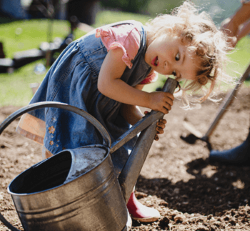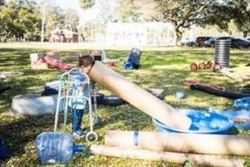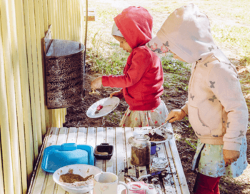Types of early education provision
You can find out more about different types of childcare available below and then use our Herefordshire Early Years Education and Child Care Directory to start your search for childcare.
Nannies and home child-carers

You would employ a nanny or au pair to care for children, usually in your own home. Information on employing a nanny and your legal obligations can be found on sites such as Nannytax. A nanny can register with Ofsted as a home child-carer on the voluntary childcare register. Nannies cannot offer funded places for 2, 3 and 4 year olds as they are not register on Ofsted early years register.
Important facts to consider:
- Children are looked after in their home
- Can be registered with Ofsted
- Can care for children of one or two families together, in the home of one of the families
- May be able to work flexible hours
- May be able to take or collect children from early years settings or schools
- Cannot offer Early Education Funded places
- Can be found through a Nanny or Au Pair Agency
Please note, the Early Years Education and Child Care Directory does not hold information on nannies and au pairs (a nanny from a different country who lives with your family).
Childminders

Childminders on domestic premises
A childminder is a person who is registered with Ofsted or a childminder agency and receives payment for working in their own home (domestic premises), looking after at least one child for more than two hours a day. This type of registration allows childminders to work for some of the time on non-domestic premises.
Childminders can work alone or with other childminders and assistants. They can only have a maximum of four adults, including themselves, working at the same time.
If there are five or more people working together to provide or assist with childcare on a domestic premises, this is a childcare on domestic premises provider and a type of group provision.
Childminders without domestic premises (CMWDP)
A 'childminder without domestic premises' is a childminder who works solely from somewhere other than a home, like a community or village hall. Childminders without domestic premises cannot work from their or anyone else's home at any time under this type of registration.
The childminder will have a primary premises registered with Ofsted or a childminder agency. This is the place where they mainly work from. Childminders can have multiple approved non-domestic premises but can only provide care from one premises at any one time.
Childminders can only have a maximum of four adults, including themself, working at the same time. More than four people working together as a group at any one time is a childcare on non-domestic premises registration (CONDP).
Childminders who provide education and childcare in their own home can look after up to a *maximum of six children under the age of 8 and normally only three of them can be under 5 years old at any one time. *If they have an assistant or work with another childminder, this will increase the number of children cared for on site.
Important facts to consider:
- Registered with either Ofsted or a childminder agency, you can ask the childminder for their Ofsted Unique Reference Number (URN) to look up their inspection report
- Offer a home-from-home environment
- May be able to work flexible hours to suit your needs particularly if you work shifts, or if your hours change from week to week
- Will often take or collect children from other early years settings or school
- May offer care for older children in the school holidays and before or after schools
- Care for small groups of children
- Some childminders offer early education funded places
- May work with other childminders or have assistants
- Some work weekends
- Some provide overnight care
Day nurseries

A day nursery can be privately run, or school based and can be found on varying types of premises. They can provide education and childcare for children from birth to 5 years old.
They must follow strict staff to child ratios according to Ofsted regulations. Opening times tend to coincide with a standard working day, typically between 7.30am - 6.30pm for privately run nurseries, many are open almost all year.
Important facts to consider:
- They usually have fixed opening times and are open all day and during the school holidays to meet the needs of working parents
- They may also offer before and after school childcare and holiday care for school aged children
- Reassurance that there will always be someone there to care for your child - even if someone is off sick
- Day nurseries may be on premises used solely for childcare, or may be on domestic premises, for example the home of the nursery owner
- Can accommodate large groups of children
- Most nurseries offer early education funded places
Independent school nurseries

Independent school nursery classes provide education and care for children as part of the school in which they are based. These settings may take children from 3 months of age, but more often from 2 years of age.
Independent nursery classes may not be registered with Ofsted, but will be registered with the Independent Schools Inspectorate.
Important facts to consider:
- Part of the school's registration
- Have a limited number of places available
- May be led by a qualified teacher
- You can apply for a place by contacting the school directly
- The school may also offer places for children before and after school as a wrap-around service and/or during school holidays
- May offer early education funding places
Pre-school playgroups

Pre-school playgroups provide early education and childcare for children aged between 2 to 5 years.
Pre-schools have to meet the same Ofsted standards as all other registered settings and must adhere to staff and child ratios as outlined by Ofsted.
Important facts to consider:
- They usually offer half day sessions, term time only, although some may offer extended hours
- May be held in a community building and places may be limited
- Will be registered with Ofsted
- They may also offer before and after school childcare and holiday care for school aged children
- Can accommodate large groups of children
- Most pre-schools offer early education funded places
Maintained nursery schools and classes

Children attending a maintained nursery school or classes are considered pupils of the school. However, admission to a school nursery is completely separate from admission to a reception, and a place in a reception class is not guaranteed.
Maintained nursery schools and classes provide education and care for children as part of the school in which they are based. These settings may take children from 2 years of age, but more often from 3 years of age.
Maintained nursery schools and classes have to meet the same Ofsted standards as all other registered settings and provide care and education to meet the needs of all children.
Important facts to consider:
- Registered with Ofsted as part of the school
- Maintained nursery schools offer places to nursery aged pupils only
- Led by a qualified teacher
- Have a limited number of places available
- Only open during school hours in term time
- The school may also offer places for children before and after school as a wrap-around service and/or during school holidays
- You can apply for a place by contacting the school directly
- Offers early education funding places
Academy and free school nursery classes

Children attending academy and free school nursery classes are considered pupils of the school. However, admission to a school nursery is completely separate from admission to a reception, and a place in a reception class is not guaranteed.
Academy and free school nursery classes provide education and care for children as part of the school in which they are based. These settings may take children from 2 years of age, but more often from 3 years of age.
Academy and free school nursery classes have to meet the same Ofsted standards as all other registered settings and provide education and care to meet the needs of all children.
Important facts to consider:
- Part of the school's Ofsted registration
- Have a limited number of places available
- May be led by a qualified teacher
- You can apply for a place by contacting the school directly
- The school may also offer places for children before and after school as a wrap-around service and/or during school holidays
- Offers early education funding places
Before and after school care - wraparound

Help with costs
Eligible parents and carers can get support to help pay for wraparound childcare costs through Universal Credit childcare (with an 85% subsidy) or Tax-Free Childcare (covering 20% of costs, up to £2,000 a year, or up to £4,000 for disabled children up to age 16). To check eligibility for help towards childcare costs visit Childcare Choices.
About wraparound childcare
These settings allow children to attend before and after school and sometimes during the school holidays. They mainly provide care for 3 to 11 year olds. Many offer a variety of activities on top of the normal school day. These range from activities such as music, art or sport to extra study support.
They are in or near schools or youth and community centres and can be run by activity companies, nurseries, schools and voluntary or private companies. A few may collect your child from school and take them to the club if they are off the site of a school, which is a service many childminders also provide.
From September 2024, parents can expect to see an increase in the number of wraparound childcare places available across the country due the government expansion of this provision.
The aim is that all parents in England with primary school aged children will be able to access wraparound care in their local area.
Types of out of school care:
- Breakfast clubs - open in the morning before school
- After school clubs - open after school until around 6pm
- Holiday play schemes - open during the holidays with varying opening hours
Important facts to consider regarding out of school care:
- May be registered with Ofsted as part of the school
- Can run before and/or after school or nursery
- May take children to their school classroom and/or pick them up at the end of the school day
- May have mixed age ranges in the same space
- May offer early education funding
- May offer a snack or meal
For further information on wraparound childcare please email the Herefordshire Wraparound Team at wraparound@herefordshire.gov.uk
Holiday schemes

Holiday schemes give children aged 3 years and over opportunities to mix with others in a safe place during the school holidays. Holiday schemes usually offer children the chance to try new activities and go on outings.
Important facts to consider:
- They may run for all or only part of the school holidays and this may change each holiday
- Some schemes will cater for large groups of children
- You may be asked to provide food for your child
- Some schemes will be required to register with Ofsted
